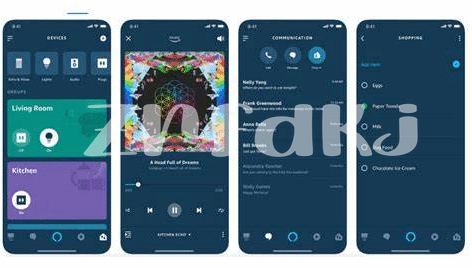- Introduction to Ai Personal Assistant Apps 🌐
- Time-saving Features and Organization 🕒
- Task Management and Productivity Tools 📊
- Voice Command Capabilities and Ease of Use 🗣️
- Integration with Smart Home Devices 🏡
- Privacy and Security Considerations in Ai Apps 🔒
Table of Contents
ToggleIntroduction to Ai Personal Assistant Apps 🌐
Sure, I will do that.
With the advancement of technology, AI personal assistant apps have become an integral part of daily life for many individuals. These innovative applications are designed to simplify and optimize various tasks, helping users to better manage their time and activities. From organizing schedules and setting reminders to providing real-time information and facilitating communication, AI personal assistant apps offer a wide range of features and functionalities that contribute to streamlining daily life.
Time-saving Features and Organization 🕒
As our lives become increasingly fast-paced, time-saving features and organization have become crucial aspects of AI personal assistant apps. These apps are designed to streamline daily tasks and optimize productivity, offering a range of innovative capabilities to help users manage their time more efficiently. From scheduling appointments to setting reminders and organizing to-do lists, these AI-powered tools provide a seamless approach to time management. Through intuitive interfaces and intelligent algorithms, they prioritize tasks based on urgency and importance, ensuring that users can make the most of their valuable time. Additionally, these apps often incorporate advanced organizational features, such as categorizing tasks, setting priorities, and creating customized workflows, further enhancing productivity.
Utilizing AI technology, these personal assistant apps can analyze patterns in users’ behavior and preferences, offering personalized suggestions and automating routine tasks. With the ability to learn from user interactions, they continually adapt to individual needs, saving time and simplifying daily routines. By harnessing the power of AI, these apps not only contribute to efficient time management but also facilitate a more organized and structured approach to daily life.
Task Management and Productivity Tools 📊
Task management and productivity tools are key features of AI personal assistant apps, offering users the ability to efficiently organize their daily responsibilities and enhance overall productivity. These apps provide seamless integration with calendars, allowing users to schedule and prioritize tasks with ease. In addition, they offer task tracking and progress monitoring functionalities that enable users to stay on top of their commitments. With features such as reminders and notifications, users can effectively manage their time and ensure that important tasks are not overlooked or forgotten. Moreover, AI personal assistant apps often include tools for creating to-do lists, setting deadlines, and categorizing tasks, empowering users to optimize their workflow and accomplish more in less time.
Furthermore, these apps often come equipped with collaboration features, facilitating teamwork and project management within a unified platform. The integration of productivity tools such as file sharing, task assignment, and progress updates enables seamless coordination among team members, fostering efficiency and maximizing overall output. These functionalities not only streamline individual task management but also contribute to collective productivity, making AI personal assistant apps valuable assets for both personal and professional use.
Voice Command Capabilities and Ease of Use 🗣️
Voice Command Capabilities and Ease of Use 🗣️
Voice command capabilities have revolutionized the way we interact with our devices, offering a seamless and hands-free experience. These AI-powered personal assistant apps are designed to understand natural language commands, allowing users to perform a wide range of tasks with just their voice. From setting reminders and sending messages to controlling smart home devices, the convenience and efficiency of voice command capabilities are unparalleled. Additionally, the ease of use is a key selling point, as these apps are often equipped with intuitive interfaces and responsive voice recognition technology, making them accessible for users of all ages and technical proficiencies.
To learn more about optimizing your digital communication, check out this guide on which messaging app is best for Android, and ensure your chats are secure and private.
Integration with Smart Home Devices 🏡
Smart home devices have become an integral part of modern households, and the integration of AI personal assistant apps with these devices is revolutionizing convenience and efficiency. Imagine being able to use a single app to control your lights, adjust the thermostat, and even start your coffee maker, all through simple voice commands or a few taps on your smartphone. The seamless integration of AI personal assistant apps with smart home devices is creating a more connected and automated living experience, allowing users to manage their homes with unprecedented ease and convenience.
Surely certain occurrences being occur occurred living in a society strongly digitally digitally involved.
Privacy and Security Considerations in Ai Apps 🔒
When embracing the convenience and efficiency offered by AI personal assistant apps, it’s crucial to prioritize privacy and security. As technology evolves, so do the potential vulnerabilities that can put our sensitive information at risk. Therefore, it’s imperative to stay informed about the privacy policies and security measures implemented by the AI apps we use. With the increasing sophistication of AI, the potential for data misuse or unauthorized access demands a heightened awareness from both users and developers. We must actively seek out AI personal assistant apps that demonstrate a strong commitment to safeguarding our privacy and maintaining robust security measures.
By understanding the importance of privacy and security considerations in AI apps, users can make informed decisions about the apps they integrate into their daily lives. Likewise, developers and tech companies must continue to prioritize ongoing improvements in security protocols and privacy features to ensure users can confidently rely on AI personal assistant apps without compromising their sensitive information.




